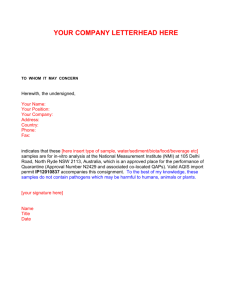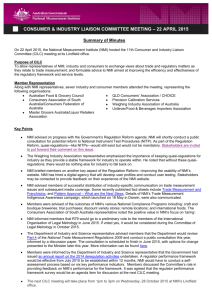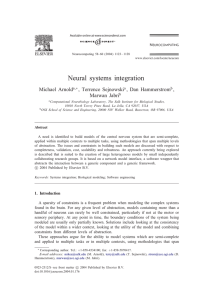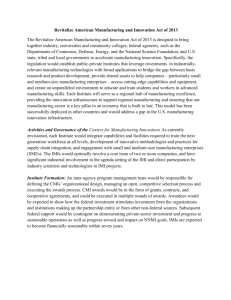Global Sustainability Summit 2015 Sustainable Food: Whose problem is it anyway?
advertisement
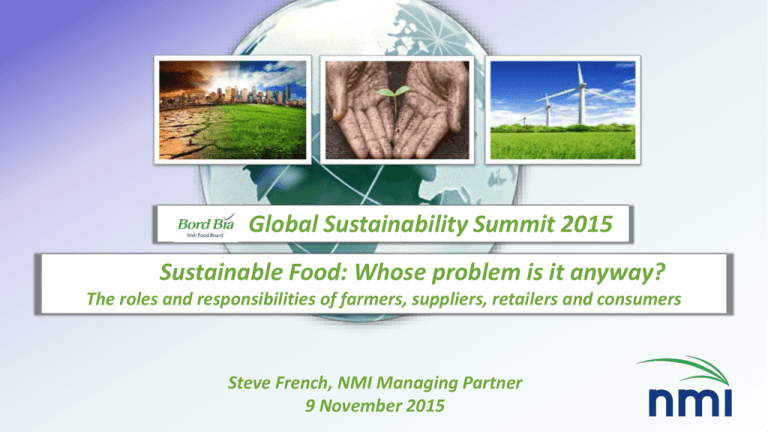
Global Sustainability Summit 2015 Sustainable Food: Whose problem is it anyway? The roles and responsibilities of farmers, suppliers, retailers and consumers Steve French, NMI Managing Partner 9 November 2015 © 2014, Natural Marketing Institute 1 Turning problems into strategies and solutions… a consumer-based perspective. Farmers Retailers Suppliers Consumers The more information consumers have, the more responsible their decisions tend to be – and greater transparency creates demand on the entire supply chain to become more responsible corporate citizens. © 2015, Natural Marketing Institute (NMI) All Rights Reserved 2 In many consumers’ minds, sustainability is increasingly becoming more meaningful, relevant and necessary – a global cultural shift impacting their entire lifestyle. “When the winds of change blow, some people build walls, others build windmills” - Chinese proverb © 2015, Natural Marketing Institute (NMI) All Rights Reserved 3 And the sustainable consumer economy is exploding: U.S. to represent $1.5 trillion by 2020. 2005 (US$ MM) 2012 (US$ MM) 2020 (US$ MM) $607 $700 $820 Alternative Transportation $6,121 $185,045 $572,440 Green Building $35,401 $55,722 $116,684 Natural Lifestyles $5,394 $6,394 $8,913 Organic Cotton/Natural Fiber & Textile $4,018 $7,545 $8,756 Personal Health $25,140 $36,980 $47,148 Ecotourism $24,200 $144,200 $416,929 Electronics/ Appliances $39,902 $119,491 $161,648 Consumer Packaged Goods $57,271 $104,664 $191,087 $198,054 $660,740 $1,524,425 Alternative Energy Grand Total © 2015, Natural Marketing Institute (NMI) All Rights Reserved 4 Sustainability dimensionality to consumers means many different things. While consumers care about sustainability, it is often a complex concept for many to grasp. Waste reduction Sustainable sourcing Humane animal treatment Water conservation Rainforest protection © 2015, Natural Marketing Institute (NMI) All Rights Reserved Fair labor Forest preservation 5 Fair trade Global consumers show strong orientation toward eco-friendliness and sustainability. % consumers indicating “It is important for companies to not just be profitable, but to be mindful of their impact on the environment and society.” 100% 80% 60% 40% 20% 0% Japan Germany UK: 47% © 2015, Natural Marketing Institute (NMI) UK US India South Africa Brazil Russia China "I think the country can have strong economic growth by focusing on “green” industries” All Rights Reserved 6 McDonald’s of Ireland recognizes their responsibility to protect and preserve the environment for future generations. “We at McDonald’s recognise our responsibility to protect and preserve the environment for future generations. All of our activities are centred around reducing our impact on the environment. Every day we serve over 150,000 customers in Ireland and our actions can be really positive. Our goals are to minimise water and energy consumption, continuously increase recycling rates and work in our local communities to have a positive effect on the environment.” Source: http://www.mcdonalds.ie/iehome/our_story/environment.html © 2015, Natural Marketing Institute (NMI) All Rights Reserved 7 The importance of sustainably grown food continues to grow among the U.S. population. “It’s important for my store to have foods grown on farms that practice sustainable agriculture” 60% 44% 2005 © 2015, Natural Marketing Institute (NMI) All Rights Reserved 8 2014 Stonyfield Farm continues to drive transparency with its source map. “I will choose products from sustainable sources over other conventional products” % U.S. change, 2010-2014: +29% The New Hampshire-based organic dairy brand worked with SourceMap to create a map detailing the location, farm conditions and history for each of its ingredients, ranging from the dairy farms that supply its milk to the peaches, pears and raspberries that flavor its products. © 2015, Natural Marketing Institute (NMI) All Rights Reserved 9 Unilever’s Global Sustainability Initiatives “We are integrating sustainability into our strategy, brands and innovation to help drive business growth. We are working with our customers and suppliers, engaging employees and forging new partnerships.” © 2015, Natural Marketing Institute (NMI) All Rights Reserved 10 But not all sustainability initiatives are successful: Focus is key. Start small. Increase involvement over time. 5 ways in which London 2012 failed to be ‘The Green Olympics’ 1. 3.4 million tons of CO2 2. The failure of carbon offsets 3. The embarrassing PR gaffes 4. Transportation chaos 5. The aftermath Source: http://inhabitat.com/6-ways-in-which-london-2012-has-failed-to-be-the-green-olympics/ © 2015, Natural Marketing Institute (NMI) All Rights Reserved 11 Consumer segments in any country exhibit various shades of ‘green’. • While some consumers have ‘deep green’ consciousness, there are varying levels of consumers within any geographic population. GREENEST • The ‘greenest’ segment drives sustainability to the mainstream. • The more mainstream segments have varying motivations, but are vital to creating scale to the supply chain. Therefore, eco and social consumer-facing initiatives will appeal differently to different segments of consumers. LESS GREEN © 2015, Natural Marketing Institute (NMI) All Rights Reserved 12 Not all consumers are created equal: NMI’s global consumer segmentation model. LOHAS®: 22% • Active environmental stewards • Early adopters & influencers NATURALITES®: 21% • Strong secondary target for natural/green CPG brands UNCONCERNEDS®: 15% • Unconcerned about the environment and society DRIFTERS®: 24% • Newer to green • In search of easy green changes © 2015, Natural Marketing Institute (NMI) All Rights Reserved CONVENTIONALS®: 18% • Practical & rational • Driven by cost savings 13 The “sustainability product lifecycle” dictates that critical mass be generated. Emerging Products • • • • • • • Green dry cleaning Bio-based products Alternative fuels Carbon offsets Green banking Organic clothing Many others… Mainstreaming Awareness Trial Adoption Loyalty Influence All Rights Reserved Energy-efficient appliances Organics Air purifiers Reusable grocery bags Hybrid cars Solar panels NATURALITES CONVENTIONALS DRIFTERS LOHAS © 2015, Natural Marketing Institute (NMI) • • • • • • 14 How does sustainability link to Millennials? Millennials…. Demand genuineness and transparency from companies Are early adopters with solutions that align with their values Are highly influential (good news travels fast, but bad news even faster) Expect everything to be technologically-friendly They link personal sustainability to the world, its environment, and people And ‘green’ is not just about the environment; the social side is imperative © 2015, Natural Marketing Institute (NMI) All Rights Reserved 15 Sustainable attitudes are driving consumers’ purchase behavior…. HIGHER PERCEPTIONS HIGHER TRIAL MORE CHOICE © 2015, Natural Marketing Institute (NMI) All Rights Reserved “Seeing that a product is environmentally friendly makes me think that it is higher quality” “Knowing that a company is mindful of its impact on the environment and society makes me more likely to try their products” “When given the choice to buy a product or service, I make my decisions with an understanding of the effect they will have on the health and sustainability of the world, its environment, and people” 16 But consumers are not willing to sacrifice... “I do not want to sacrifice “-----” when buying environmentally-friendly products.” “Quality” 71% “Price” 63% “Convenience” 46% Over half of global consumers (54%) indicate they do not want to sacrifice “anything” when buying e-friendly products. © 2015, Natural Marketing Institute (NMI) All Rights Reserved 17 Global environmental concerns can provide supply chain focus. EMERGING COUNTRIES 1 2 3 4 5 6 DEVELOPED COUNTRIES Top Environmental Concerns Food safety Water conservation/quality Global warming Deforestation Hazardous, toxic, and nuclear waste Pollution © 2015, Natural Marketing Institute (NMI) All Rights Reserved 1 2 3 4 5 6 18 Top Environmental Concerns Food safety Global warming Deforestation Hazardous, toxic, and nuclear waste Water conservation/quality Overfishing Cross-industry learnings can provide thought transfer. Levi's is the first major retailer to include end of life messaging on their clothing products. When our CEO Chip Bergh shared how often he doesn’t wash his jeans the world took notice. • Up to 96% less water used to make Water<Less™ jeans • 172 million liters of water saved so far using Water<Less™ finishing • 13 million products in Levi’s® Spring '12 collection made with Water<Less™ finishing This initiative is aimed at diverting some of the 23.8 billion pounds of clothing and textiles that end up in U.S. landfills every year. © 2015, Natural Marketing Institute (NMI) All Rights Reserved 19 Global warming is one such issue which is so relevant to consumers that they are changing their own behavior to lessen global impact. Consumers are aware that more has to be done to stem the tide of global warming and are not only trying to change their own behavior but look to corporations to also do the right thing. % U.S. general population indicating… % U.S. general population indicating… “Global warming is a major problem that needs to be addressed quickly” “I have personally changed my behavior to minimize my effect on global warming” 49% 2014: 60% 41% 2013: 57% © 2015, Natural Marketing Institute (NMI) All Rights Reserved 2009 20 2010 2011 2012 2013 2014 Across the globe, consumer concern is very high regarding socially responsible business. % of consumers who indicate they care about ‘socially responsible business’ 54% 60% Japan Germany © 2015, Natural Marketing Institute (NMI) All Rights Reserved 65% 69% 70% Russia U.S. UK 21 78% 85% 86% 94% South Brazil India China Consumers are also showing increased engagement in global environmental and social seals/certifications. Consumers are more likely to purchase a food/beverage product if it had the following label... Global protection of farmers and farm workers © 2015, Natural Marketing Institute (NMI) All Rights Reserved Protecting global ecosystems, people, and wildlife 22 Protecting marine life globally Specific environmentally-friendly product attributes are showing growth in importance toward consumers’ food and beverage purchase. Ranked in descending order by U.S. growth in importance (2007-2014) Free-range/cage free USDA certified organic Organically grown Grass-fed (for meat) Fair Trade certified ingredients From farms that practice sustainable agriculture No genetically modified organisms (GMOs) Grown without pesticides Locally grown Environmentally friendly packaging materials © 2015, Natural Marketing Institute (NMI) All Rights Reserved 23 Applegate Farms provides a code so consumers know exactly where their product originated. The “Barn Code” shows from what state or country the meat is sourced. In addition to its origin, Applegate Farms also shows other attributes. © 2015, Natural Marketing Institute (NMI) All Rights Reserved 24 Corporate transparency is vital. McDonalds understands this. Through the campaign, McDonald’s is indeed allowing the public’s prying eyes into many of the places where critics have raised questions — and its performance and products hold up pretty well under the glare. Source: http://www.sustainablebrands.com/news_and_views/organizational_change/dale_buss/now_you_can_peer_mcdonalds_%E2%80%93_do_you_see_customers © 2015, Natural Marketing Institute (NMI) All Rights Reserved 25 Top 10 companies/brands perceived as “good corporate citizens” when it comes to environmental or social issues. 1. Whole Foods Market 2. General Mills 3. McDonald's 4. Johnson & Johnson 5. Dove 6. Trader Joe's 7. Kellogg 8. SC Johnson, A Family Company 9. Seventh Generation 10.Walmart Ranked in descending order by U.S. general population consumers © 2015, Natural Marketing Institute (NMI) All Rights Reserved 26 Consumers prefer to use the package label in order to gain information about eco-friendly products – more than media, articles, websites or ads. Package label Something I read in an article Websites In-store signs Ads in a newspaper or magazine Ads on radio or TV Direct mail Ranked in descending order by U.S. general population consumers © 2015, Natural Marketing Institute (NMI) All Rights Reserved 27 And Ben & Jerry’s appears to have it covered! © 2015, Natural Marketing Institute (NMI) All Rights Reserved 28 Business has a responsibility to give back to the community.“ -Ben Cohen In the end, need to balance people, planet and profits. Consumers’ “green” consciousness is growing…… Sustainability is here to stay © 2015, Natural Marketing Institute (NMI) All Rights Reserved Impact of CSR on trial and purchase is growing Feel more responsible for protecting environment 29 Sustainable initiatives boost ROI Closing Thoughts Sustainability is not just a fad, but a global shift that’s here to stay Sustainability has broad impact across brand appeal and CSR Sustainability has a multifaceted return on investment Many consumers want products manufactured in a sustainable manner – but “no sacrifice” exists Sustainable action can no longer be considered a nice to have – globally, consumers expect and demand it Bord Bia is to be commended on its efforts – a global best practice © 2015, Natural Marketing Institute (NMI) All Rights Reserved 30 Natural Marketing Institute (NMI) 272 Ruth Road Harleysville, PA USA 19438 Steve French Managing Partner Steve.French@NMIsolutions.com +1 215 513 7300 x214 www.NMIsolutions.com All materials herein are © 2013-2015 by NMI (Natural Marketing Institute). All rights reserved. Reproduction, publication (internal and/or external), transmission, or other use of any of the within materials, including but not limited to graphics, data, and/or text, for any commercial or noncommercial purposes, is strictly prohibited without the prior express written permission of NMI. © 2015, Natural Marketing Institute (NMI) All Rights Reserved 31 Data Source: NMI’s Global LOHAS Consumer Trends Database® Sustainability Covers 15 market sectors • • • • • CPG Green Building Transportation Electronics Investing • • • • • • • • • Energy Eco-Travel Eco-Apparel Pet Care Others 200 LOHAS-related attitudes, drivers to consumer behavior Usage patterns across industries, product categories and brands Behavior/demos related to green activities, including memberships and non-profit donations Information sources LOHAS Consumer Trends Database® Since 2002 © 2015, Natural Marketing Institute (NMI) All Rights Reserved Scope: Annual tracking study in U.S. since 2002 and globally since 2005 Quantifies the size of the consumer market for environmentally and socially responsible products and services Measures the importance of environmental and societal issues as well as corporate social responsibility Explores the “why’s” behind environmentally conscious behavior Determines consumer usage of sustainable products and services Methodology: Conducted in 23 countries Based on 150,000+ consumer interviews Nationally representative in each country 32
